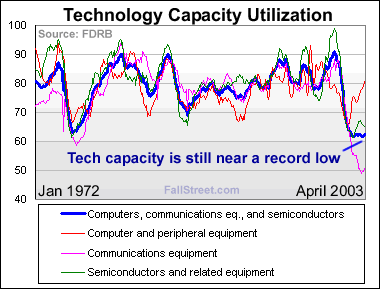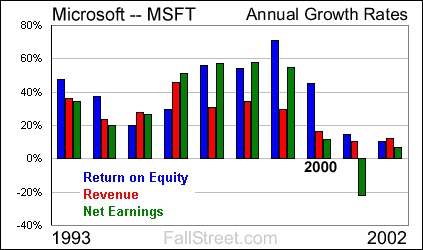May 27, 2003
Bush Hopes That Investors Will Hold On
The main reason why the greatest bull market of all time was able to roar for so long – from August 1982 to March 2000 – was because investor’s became increasingly comfortable owning stocks as opposed to bonds (see ‘declining equity premium’). By contrast, the main reason why the current bear market has lasted so long is because investors have turned increasingly uneasy about owning stocks (as opposed to bonds, MM, cash, etc).
These observations may at first appear blatantly obvious. Nevertheless, in order to understand why President Bush just passed a tax plan geared almost entirely at rewarding stock market investors (the rich), remembering the obvious is key.
Dividend Stocks Lead the Markets
The 47 industries (SIC Codes) that closed lower last week had an average dividend yield of 1.86%, while the 55 industries that closed higher carried an average dividend yield of 2.37%. Furthermore, the top 4 industry performers last Friday were the who’s who of reliable dividend stocks (to note: the non-metallic mining industry is comprised of only four companies).
|
Taking a closer look at utilities, the XLU (Select Sector SPDR) rallied by 5.2% last week. Moreover, investor interest in the XLU peaked late in the week as Bush’s tax plan was approved; trading volume on the XLU was above 2 million for two days in row ended last week (a first), and the index tacked on 3.79% on Friday alone.
 |
Suffice it to say, the hallmark of Bush’s ‘little bitty’ tax plan - a plan that could swell into a ‘massive’ plan (est. trillion dollars) if extended through 2013 - was the reduction of dividend taxation. Last week investors rushed into dividend paying stocks.
Capital Gains Taxation
As for Bush’s half hearted attempt to lower the capital gains tax (from 20% to 15% if you hold onto the investment for more than a year), this action lacks bite. Quite frankly, if Bush was really looking to give the apprehensive investor incentive to hold onto stocks he should have adopted a punishment/reward system. For example, if you sell stocks within 1-year of your purchase your capital gains tax rate is 100% (meaning you won’t sell), and if you hold on for 10-years you get taxed at 5%.
Needless to say, discussion of capital gains taxation is a mute point (at the moment) given that the rich shelter capital, the herd is already in 401Ks, and capital gains have been hard to come by during the last three years. Quite frankly, the sidelined investor worried about entering and potentially losing money in stocks is unlikely to become excited about the prospect of lower capital gains taxes.
Dividend Rally May Already Be Over
To reiterate previous sentiments, the main reason why Bush’s tax package is not likely to fuel a broadly based stock market gains is because dividend yields are near historic lows. However, there are other reasons why Bush’s plan will fail…
To begin with, the Dow 30 is not exactly awash with quality yielding stocks. Rather, the highest yielding Dow components have high yields because they are dangerous to own: Altria, AT&T, JP Morgan, and General Motors may rally or decline regardless of the tax rate in their dividends. As for the S&P 500, the XLU (or utilities) account for only 3.07% of the average, and no other sector has an average yield that is comparable (factoring in different tax rates or not) to that of the benchmark 10-year Treasury.
|
In short, many companies that have attractive yields are dangerous to own regardless of their historical yields and the prevailing tax rate, and the S&P 500 is not likely to benefit from a push into dividends given that the primary dividend group makes up such a small percentage of the average (the possible exception being that select consumer staples may see outsized gains because of their stable dividends).
Accordingly, the assumption can be made that whether or not the markets rally or fall will depend more on how the economy performs than what the dividend tax rate is. For example, S&P Financials yield 1.65% on average and account for 20.5% of the S&P 500. Financial companies may have the best intentions in the world – they may be itching to pay out more money to shareholders – yet if the economy doesn’t perform financial stocks do not have excess cash to disperse (most financial related companies already have solid dividend policies implemented).
What about Tech?
Despite widespread balance sheet carnage in non quality tech companies, some tech leaders earn excess cash that could potential be paid out to shareholders. However, despite token dividend declarations from the likes of Microsoft, it will likely take a long-time before tech stocks become well known dividend payers with attractive yields. Quite frankly, much of the tech industry is capital intensive; investing in new technologies, companies, and ideas is what leaders like Microsoft and DELL do to stay ahead of the pack, and are likely to continue doing for the foreseeable future.
 |
That said, since investing in new technologies has become a dwindling enterprise, Bush’s tax plan could be a blessing if, and when, currently ‘hot’ technology stocks begin to retrench. The logic being that if a dominant tech player is sustaining profits and the industry is already awash with overinvestment/overcapacity, rewarding shareholders with dividends could be an option to help stabilize stock price.
* This is perhaps the lone long-term forecast to make concerning dividends: when, and if tech stocks collapse the strongest tech companies may opt to increased dividends and decrease buy backs/investment.
Microsoft: The Dividend King?
Trading at 22 times 2004 earnings estimates, 4.5 times book, and 8.5 times sales, Microsoft is an excellent example of solid company whose share price may be a little rich. The question that must be asked is whether or not growth in the 1990s was the ‘norm’ and the last 3-years the aberration, or vice versa.
 |
Given that Microsoft generates strong free cash flows (more than $10 billion in each of the last three years), and the company typically uses 80% of free cash for investing purposes, the company could potentially raise its dividend payout without deleterious effects. The catch being – an important ‘catch’ at that – is that Microsoft may only raise its dividend once the company accepts slower growth rates, and/or realizes that it can not invest free cash flow as efficiently as it once did. Obviously, if MSFT accepts/forecasts slower growth rates investors may not be willing to pay such rich premiums for the stock.
As stated, it will likely take a long time before tech stocks become notable dividend players. Nevertheless, Microsoft is one company to watch. As MSFT transforms from a growth stock into dividend stock its yield will become more important than its forward P/E. To note: every company was measured as a ‘dividend’ stock before the great bull market began - or when investors were afraid to own stocks.
Conclusions
The assumption can be made that the markets have rallied, in part, in anticipation of Bush’s tax plan. After all, the economic news - save wondrous readings in consumer confidence - has been ugly, yet the markets are up nearly 20% off their March lows (and high yielding utilities have been the top performing S&P sector this year).
Remembering what is blatantly obvious – that the current bear market has lasted so long because investors have turned increasingly uneasy about owning stocks – it is not surprising that the Fed and President are focusing their policies on stocks in an attempt to curb investor unease. Think about it: thanks to Greenspan (deflation is coming!) and Bush (look at that dividend yield!) stocks are now extra attractive on a yield basis (both compared to Treasuries and with regards to tax considerations).
In short, it is clear to everyone that stocks are overvalued based upon every historical valuation matrix except for the Fed model (interest rate model). What should also be clear to everyone is that both the Fed and President are desperately using overt forms of plunge protection (legal forms mind you) to ensure that the stock markets do not deflate.
With an estimated 35 million Americans (half of which are senior citizens) receiving dividend income, and many near insolvent or underfunded corporate pension plans being tied to stock market gains/losses, saving the stock markets is priority number one. However, if, and when dividend investors do not spend their new found wealth, the fledging U.S. economy and escalating deficits will become priorities number 2 and 3…
|
All data and information within these pages is thought to be taken from reliable sources but there is no guarantee as such. All opinions expressed on this site are opinions and should not be regarded as investment advice.
Copyright © 2000-2003. FallStreet.com